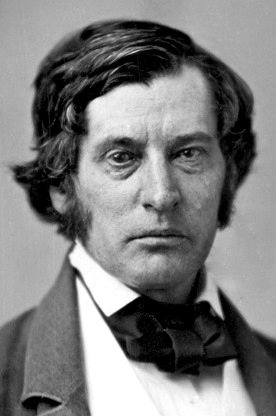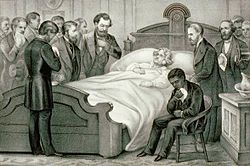Charles Sumner
Charles Sumner (January 6, 1811 – March 11, 1874) was an American politician, and lawyer. He was senator from Massachusetts from April 24, 1851 until his death.
Charles Sumner | |
|---|---|
 Daguerreotype of Senator Sumner, 1855 | |
| United States Senator from Massachusetts | |
| In office April 24, 1851 – March 11, 1874 | |
| Preceded by | Robert Rantoul, Jr. |
| Succeeded by | William B. Washburn |
| Personal details | |
| Born | January 6, 1811 Boston, Massachusetts, Massachusetts |
| Died | March 11, 1874 (aged 63) Washington, D.C. |
| Resting place | Mount Auburn Cemetery Cambridge, Massachusetts |
| Political party | Republican (earlier Whig, Free Soil, Democrat) |
| Spouse(s) | Alice Hooper Sumner
(m. 1866–1871) |
| Profession | Politician |
| Signature | |
Career
Sumner was the leader of the antislavery forces in Massachusetts. He was a leader of the Radical Republicans in the United States Senate during the American Civil War. He worked to destroy the Confederacy, free all the slaves and keep on good terms with Europe. During Reconstruction, he fought to minimize the power of the ex-Confederates and guarantee equal rights to the Freedmen.
Brook's attack
In 1856 Sumner made a speech against slavery and the Kansas–Nebraska Act. Sumner attacked many senators about bleeding Kansas and slavery including Senator Stephen A. Douglas and South Carolina's Andrew Butler. The Representative from South Carolina, Preston Brooks (Andrew Butler's nephew), became angry because he attacked his uncle. Brooks grabbed his cane and knocked Sumner onto the Senate floor.[1] Sumner had to stop his political career until he recovered two years later.
Personal life
Sumner was born on January 6, 1811 in Boston, Massachusetts.[2] He studied at Boston Latin School and at Harvard College. Sumner was married to Alice Hopper from 1866 until they divorced in 1873. They had no children. Sumner died on March 11, 1874 in Washington, D.C. from a heart attack, aged 63.
Charles Sumner Media
Sumner by Mathew Brady c. 1865
President Ulysses S. Grant, photographed by Mathew Brady in 1869.The Dominican Republic annexation treaty caused bitter contention between President Grant and Senator Sumner.
Charles Sumner House, Boston
Sumner and Henry Wadsworth Longfellow photographed by Gardner in 1863
References
- ↑ William James Hoffer, The Caning of Charles Sumner: Honor, Idealism, and the Origins of the Civil War (2010) p. 62
- ↑ Long, William R. (August 8, 2005). Charles Sumner (1811-74) - Three Essays on A Massachusetts Abolitionist. www.drbilllong.com. http://www.drbilllong.com/LegalEssays/Sumner.html. Retrieved 23 December 2011.
Other websites
![]() Media related to Charles Sumner at Wikimedia Commons
Media related to Charles Sumner at Wikimedia Commons
| Wikisource has original works written by or about: |
- Mr. Lincoln and Freedom: Charles Sumner Archived 2013-05-08 at the Wayback Machine
- Sumner's "Crime Against Kansas" speech
- Works by Charles Sumner at Project Gutenberg
- The Liberator Files, Items concerning Charles Sumner from Horace Seldon's collection and summary of research of William Lloyd Garrison's The Liberator original copies at the Boston Public Library, Boston, Massachusetts.







